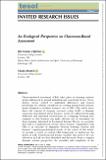Files in this item
An ecological perspective on classroom-based assessment
Item metadata
| dc.contributor.author | Chong , SW | |
| dc.contributor.author | Isaacs, Talia | |
| dc.date.accessioned | 2023-01-19T16:30:13Z | |
| dc.date.available | 2023-01-19T16:30:13Z | |
| dc.date.issued | 2023-01-03 | |
| dc.identifier | 282337376 | |
| dc.identifier | eec58224-575e-4113-be6e-9cd981a5cba9 | |
| dc.identifier | 85145483045 | |
| dc.identifier.citation | Chong , SW & Isaacs , T 2023 , ' An ecological perspective on classroom-based assessment ' , TESOL Quarterly , vol. Early View . https://doi.org/10.1002/tesq.3201 | en |
| dc.identifier.issn | 0039-8322 | |
| dc.identifier.other | ORCID: /0000-0002-4519-0544/work/127573775 | |
| dc.identifier.uri | https://hdl.handle.net/10023/26785 | |
| dc.description.abstract | Classroom-based assessment (CBA) takes place in learning environments influenced by myriad individual and contextual factors. Nevertheless, factors related to individual differences and learner psychology are seldom considered in creating instructional environments designed to facilitate learners’ use of CBA. This article introduces the concept of language assessment ecology (LAE)—a dynamic classroom environment where learners’ needs are addressed through deliberate and informed orchestration of language learning environment so that learners can make effective use of assessment for their learning. Informed by Ecological Systems Theory, we postulate that LAE is a multi-layered system, where learners’ engagement with CBA is an outcome of alignment between learning contexts and learners’ cognitive-psychological needs. At the outset of this article, we provide a review of current CBA frameworks to underscore the merits of LAE. Contextual and learner variables that need to be considered in an LAE are then identified and discussed. From a complex dynamic systems perspective, the versatility and complexity of the interplay among these variables will be stressed. The article concludes with implications of LAE for conducting CBA research. | |
| dc.format.extent | 13 | |
| dc.format.extent | 286245 | |
| dc.language.iso | eng | |
| dc.relation.ispartof | TESOL Quarterly | en |
| dc.subject | LB1603 Secondary Education. High schools | en |
| dc.subject | LB2300 Higher Education | en |
| dc.subject | MCC | en |
| dc.subject | NCAD | en |
| dc.subject.lcc | LB1603 | en |
| dc.subject.lcc | LB2300 | en |
| dc.title | An ecological perspective on classroom-based assessment | en |
| dc.type | Journal article | en |
| dc.contributor.institution | University of St Andrews. International Education Institute | en |
| dc.identifier.doi | https://doi.org/10.1002/tesq.3201 | |
| dc.description.status | Peer reviewed | en |
This item appears in the following Collection(s)
Items in the St Andrews Research Repository are protected by copyright, with all rights reserved, unless otherwise indicated.

